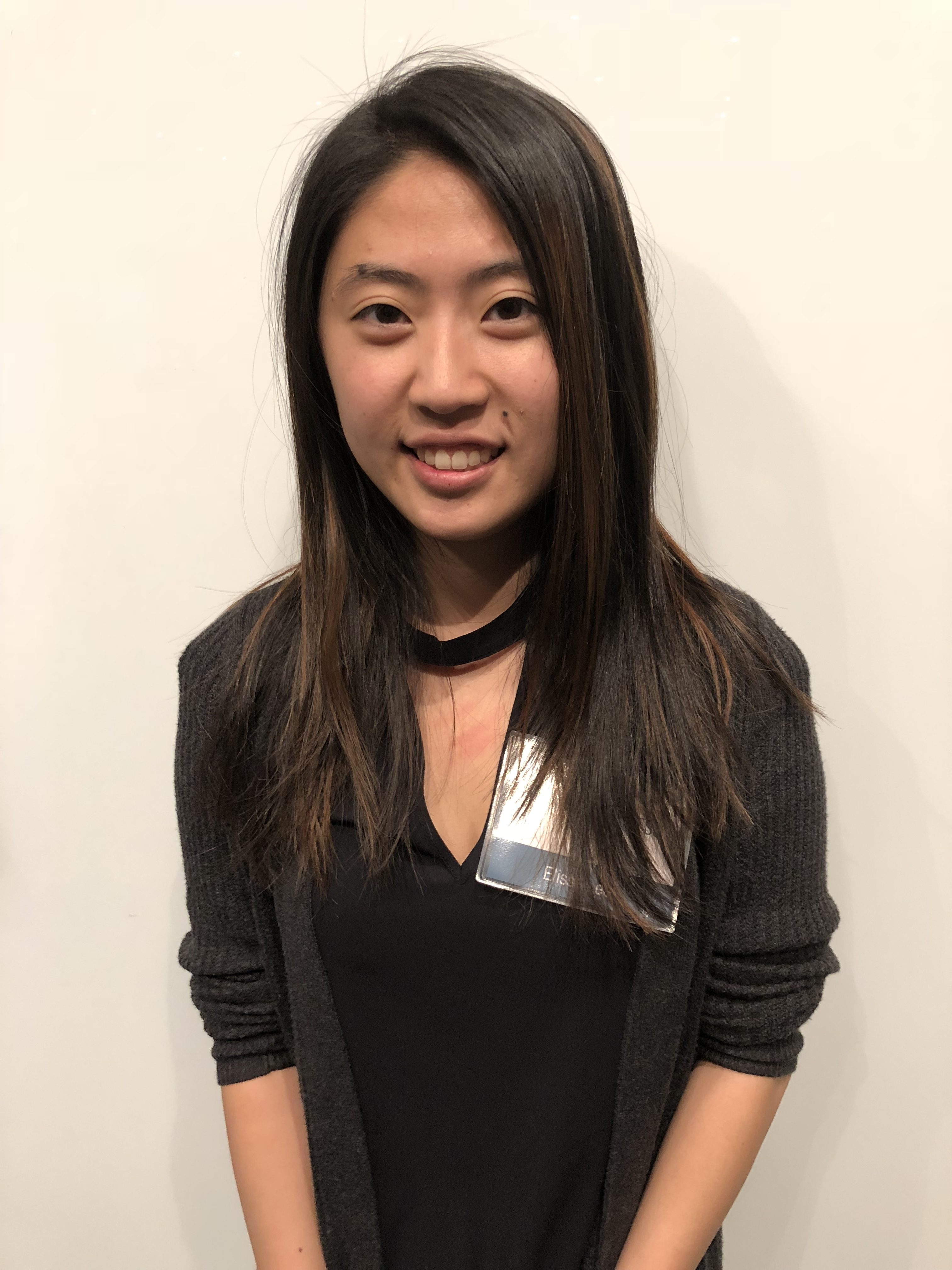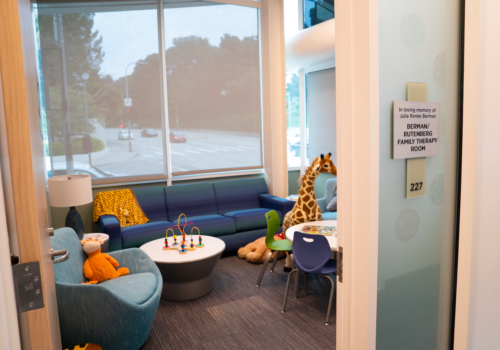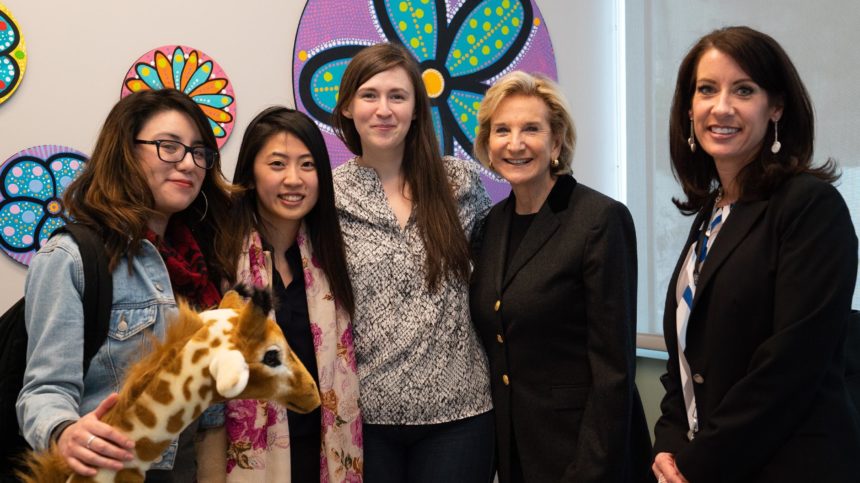
Driving down Olympic Boulevard in Century City, you cannot miss the Didi Hirsch Mental Health Services’ new relocated Suicide Prevention Center — by way of its monumental 10-foot tall sign. Not even a week after its opening this February, a woman showed up at the front desk. “She was thinking about ending her life and then saw our sign,” recounts Nancy Rubin, a member of Didi Hirsch’s Board of Directors and a daughter of Didi Hirsch. “She said it was a sign from God that she should come in and ask for help. We think that sign is bringing greater awareness, changing the conversation, and making access to help more visible.”
Suicide is the 2nd leading cause of death for 10 to 34-year-olds (NIMH) and 2nd highest cause of death amongst college students (NIMH). Since its founding in 1958, the Didi Hirsch Suicide Prevention Center has been a pioneer in training, research, and crisis services. In addition to its groundbreaking work in suicide prevention, Didi Hirsch also runs outpatient clinics and residential treatment centers throughout Los Angeles County that together help over 120,000 children, families and adults each year.
Earlier this year, Born This Way Foundation had the opportunity to visit the newly opened Suicide Prevention Center. Located at the intersection of Olympic Boulevard and Century Park West in Century City, the 14,000-square-foot structure is the first of its kind — a physical space dedicated to wraparound services around suicide, providing everything from a 24/7 multilingual Crisis Line to treatment for survivors and bereaved families.
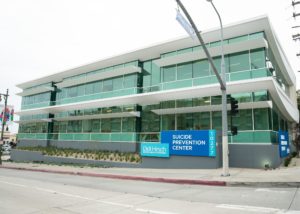
Here is a glimpse into our visit:
SUICIDE PREVENTION TRAINING
Didi Hirsch provides nearly 100 hours of intensive training to the 200 volunteers who help answer its crisis hotline. They also host suicide prevention trainings for teachers, parents and students, police officers, firefighters, business people, community groups and therapists. “There is a lack of sufficient training in grad school programs regarding suicide,” said Lyn Morris, Didi Hirsch’s Senior Vice President of Clinical Operations. “Our program helps prepare mental health professionals to work with people who are suicidal or who have experienced suicide in their families and loved ones.”
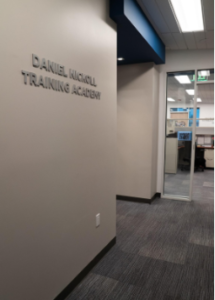
THERAPY SERVICES
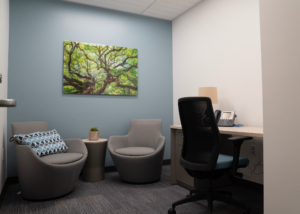
Individual, family, and group counseling are also available at the Suicide Prevention Center. As we walk through the space, it is clear that care and warmth are imbued into the fabric of the building, from the comfortable therapy chairs to the walls lined with photography and artwork donated by artists, many personally affected by suicide.
Didi Hirsch also hosts support groups for survivors of suicide attempts. “Research shows that people who attempt suicide are more at risk of attempting again,” said Morris. “Our motto is hope and healing, without hospitalization whenever possible.” There are also groups specifically held for teenage survivors who have lost someone to suicide. Some treatment activities include creating safety plans and hope boxes to store items that bring hope in times of distress.
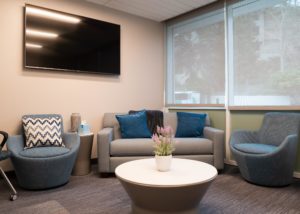
Didi Hirsch’s comprehensive services include treating children who have lost family members to suicide. Family members are included in the treatment plan and address suicide in an age-appropriate way based on the child’s development. Didi Hirsch is also developing a tool to help assess trauma in young children.
“Oftentimes children do not understand issues of suicide in their own families,” Rubin said. “Adults often will tell them that it’s something else, like a heart attack, but they find out eventually. It’s important they learn the truth and to be aware of tools to keep them safe as depression tends to run in families and there are heritable factors to suicide. But genetics is not destiny.”
CRISIS LINE

28 cubicles make up the listening cubicles for the crisis counselors. Didi Hirsch is one of only a few in the nation with crisis counselors who take calls and chats on the:
- 24/7 English and Spanish National Suicide Prevention Lifeline
- Korean-language calls during peak evening hours (4:30 pm to 12:30 am)
- SAMHSA’s Disaster Distress Helpline, which supports people in emotional distress due to natural or manmade disasters
- Crisis Chat, which is an online chat service of the National Suicide Prevention Lifeline
In 2018, they answered over 100,000 calls – twice as many as they had in 2012. Of the 100,000 calls, only 4% of the callers required intervention (usually a family member taking them to the hospital) as a result of an imminent suicide attempt or one in progress. “Most of the time, we are able to de-escalate callers in crisis and help them connect to life, to what’s meaningful in their lives,” Morris explains.
And of course, care for survivors of suicide must also include care for the therapists and volunteers who dedicate their efforts toward the cause, many of whom have been personally touched by mental illness or suicide. The building includes a break room and a meditation room, for those who need to take a moment. Trained therapists are also available to debrief after high-risk calls.

Our visit concluded with a conversation about large-scale efforts to bring suicide and suicide prevention out of the darkness, which reminded me of something I heard at the Didi Hirsch Erasing the Stigma Leadership Awards last year, where Cynthia Germanotta was honored for her work with the Born This Way Foundation. During her acceptance speech, she read a letter from Lady Gaga: “One of the greatest ways you can be kind is to change the world or someone’s life through validation. To simply validate the feelings of someone with mental health issues when they are telling you they are having self-harm urges or suicidal ideation, don’t just listen, believe them and tell them you believe them. And our next steps are to direct them to mental health professionals to help them understand their feelings, both cerebrally and behaviorally, so they can learn new patterns and see the light through the dark forest of their minds.”
So here’s to the light for all of you, and all of those in need — thank you to Didi Hirsch for illuminating the way.
To learn more about Didi Hirsch Mental Health Services, please visit: www.didihirsch.org
If you’re interested in volunteering and in the Los Angeles area, please visit: https://didihirsch.org/get-involved/volunteer/




